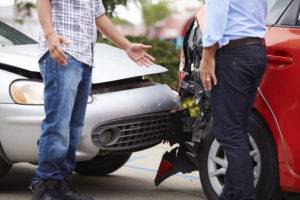Serious injury in the State of Florida is defined as an injury that causes permanent or significant loss of an essential bodily function. Also known as catastrophic injuries, serious injuries can also be injuries that cause permanent disfigurement or scarring. These injuries have a long-term and significant impact on an accident victim’s life. When juries in Florida are tasked with calculating damages in a personal injury lawsuit, they often begin by considering the seriousness of the plaintiff’s injuries.
Andrew Pickett, an award-winning personal injury attorney in Florida, is here to provide an informative guide about what is defined as a serious injury in the Sunshine State. After reading, you should be able to understand better whether or not your case may qualify for a greater award due to serious personal injury damages.
How Does the State of Florida Define Serious Bodily Injury?
Florida Statute 627.737 defines serious bodily injury as “one that causes significant and permanent loss of an important bodily function. Permanent injuries. Significant and permanent scarring or disfigurement.”
Therefore, injuries that cause blindness, paralysis or the loss of one or more limbs would always be considered serious bodily injuries. So would less severe injuries that are likely to be permanent.
Psychological Injuries vs. Bodily Injuries
When injuries are mentioned, most people think about doctors and hospitals and imagine bodily injuries like burns, cuts and broken bones. However, psychological injuries are also considered serious bodily injuries in Florida.
In a lawsuit, injury is the term used to describe the harm that the plaintiff suffered as a result of the defendant’s negligent or intentional actions. Injury can refer to property damage and economic losses like lost income as well as bodily injuries because these are all harms that the plaintiff should be compensated for.
If the injury causes emotional distress, impairment of a mental capacity or permanent psychological damage, it may be subject to serious bodily injury compensation. Psychological injuries may also be considered serious enough for a claim or lawsuit if they impact an individual’s life, and recovery cannot be guaranteed.
Lastly, any of these two injuries could also be considered serious if it causes permanent economic damage. For example, an injury that would not be considered particularly serious or permanent in most cases could become serious and permanent if it was suffered by a professional athlete and ended their career.
Need free legal help in Florida?
We specialize in personal injury claims.

What Does Florida Law Say about Serious Injuries?
Determining the severity of injuries is left up to juries in civil lawsuits, but the law does provide them with guidance. Descriptions of what is and what is not a serious injury can also be found in motor vehicle regulations and criminal laws that define offenses like assault and aggravated battery and list their penalties.
Florida Serious Injury Statutes
- 0627.737:This statute describes how badly an accident victim in Florida has to be injured in order to recover damages in a lawsuit.
- 0784.045: This law defines the crime of aggravated battery.
- 0316.027: This section of the motor vehicle code lists the penalties for leaving the scene of an accident that caused death or serious injury.
These laws all mention serious injuries, and they all have similar definitions for the term. According to Florida law, an injury becomes serious when:
- It causes the permanent and significant loss of sight, mobility or other important bodily functions
- Doctors believe with a reasonable degree of confidence that it is likely to be permanent
- It causes permanent disfigurement or scarring
- It causes death or will likely lead to death
Damages for bodily injury are often higher when the injuries are more serious because serious injuries cost more to treat. Also importantly, accident victims who are badly hurt are also awarded more money when they suffer greater pain and suffering or are left unable to enjoy their lives as much as they once did.
Causing and Contributing to an Injury
When accident victims file lawsuits in Florida, they must be able to establish that the defendant’s actions were the proximate cause of their injury, loss or damage. That means they must convince the jury that the accident would not have happened if the defendant had not acted negligently or recklessly.
The problem is that both parties are sometimes at fault. In states that follow the contributory negligence doctrine, accident victims are prevented from recovering damages if they were responsible in any way for causing an accident.
Florida is what is known as a purecomparative negligence state, which means that you can file a lawsuit and recover damages even if you cause an accident as long as the defendant contributed to your injuries.
For example, if you run a red light and are struck by a speeding car, you could pursue legal remedies if the other driver could have avoided you by slowing down. However, the jury would likely conclude that you were mostly to blame in this situation, and they would reduce the amount of damages they award you accordingly.
Florida Accident Injuries That Would Be Considered Serious
Most personal injury lawsuits in Florida are brought by car accident victims who suffered injuries that an auto insurance policy’s PIP coverage would not provide adequate compensation for. These are usually injuries that significantly impair an important bodily function and are likely to be permanent.
Nearly Fatal Injuries
The most serious accident injuries substantially increase the risk of death and cause extreme physical or mental pain and suffering. It is important to bear in mind that substantially increasing the risk of death does not mean death is inevitable. This is because the preponderance of the evidence is the standard of proof in a personal injury lawsuit. Under this standard, a substantial risk of death means death is more likely than not.
Disfiguring Injuries
An injury that causes disfigurement permanently changes a person’s body. Accident victims are disfigured when they lose a hand, foot, arm or leg or their appearance is permanently marred by burns or scars. Disfigurement causes emotional as well as physical pain, and it can turn an outgoing person into a recluse. Disfigured plaintiffs often suffer from low self-esteem and may avoid social gatherings that they would have once looked forward to, which greatly diminishes their quality of life.
Bodily Injuries
Bodily injuries are injuries that cause physical or mental harm, and they become serious when the harm they cause is likely to be permanent. Not all bodily injuries leave scars or bruises. Psychological conditions like post-traumatic stress disorder are considered bodily injuries even though they have no physical symptoms. Illnesses and conditions that impair the function of internal organs are also bodily injuries.
Permanent Injuries
Determining whether or not an injury is permanent is usually done after thedate of maximum medical improvement is reached. This is the point where doctors conclude that further recovery or lasting improvement is unlikely. However, injuries that cause disfigurement, blindness or paralysis would be considered permanent much earlier.
Scarring
Scars are the visible marks that are left behind after an injury has healed, and they can be just as psychologically devastating as disfigurement. Scarring on parts of the body that are visible cause great emotional distress, and they can make finding work extremely difficult for people with occupations that require them to deal with the public.
Lawsuit plaintiffs who are left disfigured or badly scarred by an accident are often awarded significantly increased damages to compensate them for their emotional pain and suffering and lost income, and this is especially true if they are young.
Lingering Health Issues
Accident victims often deal with health issues long after their cuts, bruises and broken bones have healed, and their only treatment options are often rest and physical therapy. Damaged ligaments and nerves can take months or even years to heal, and there is rarely much doctors can do to speed up the process.
Common lingering health problems that accident victims have to cope with include:
- Weakness and fatigue
- Numbness and tingling
- Headaches and joint pain
- Impaired mobility
- Ringing in the ears
Types of Personal Injury Lawsuit Damages in Florida
Accident victims can recover the following three types of damages in Florida:
- Economic damages: These damages compensate accident victims for the financial losses they incurred due to the negligent or reckless actions of the plaintiff, and they are commonly awarded to cover medical bills, lost income and the costs of repairing damaged property.
- Noneconomic damages: These damages are awarded to compensate lawsuit plaintiffs for the intangible consequences of an accident like pain and suffering, loss of companionship and reduced quality of life.
- Punitive damages: These damages are awarded to punish the defendant. Punitive damages are rare in personal injury cases because the defendants usually caused accidents that they would have preferred to avoid, but they may be awarded when the lawsuit is based on an intentional tort like assault.
Need free legal help in Florida?
We specialize in personal injury claims.

Criminal and Civil Penalties for the Offense
The defendants in personal injury lawsuits sometimes face consequences in criminal as well as civil court. Causing an accident does not usually lead to criminal charges, but exceptions could be made when serious injuries are caused by gross negligence or an intentional act.
Personal injury defendants that could face criminal sanctions include employers that ignored safety regulations and created a work environment where death or serious injury was inevitable, drunk drivers, surgeons who performed operations while intoxicated and motorists who committed acts of road rage.
Driver’s License Suspensions
Drivers who cause accidents sometimes lose their driving privileges. Drivers who are convicted of DUI always lose their driver’s licenses, and they face longer bans if they have prior drunk driving convictions.
A motorist who refuses to provide a blood or breath sample for toxicology testing after being arrested on drunk driving charges will face a mandatory ban under Florida’simplied consent law even if they are not convicted, and a sober driver can lose their driving privileges if they committed a motor vehicle violation before crashing and already had points on their record.
Suing for Pain and Suffering in Florida
Accident victims who file lawsuits in Florida can seek compensation for both their emotional and physical pain and suffering. However, pain and suffering are intangible, which means they can be difficult to prove. If you suffered an accident injury and wish to seek compensation for your lingering emotional or psychological pain, you will need to support your claim with evidence because you will not have any bills to show the court.
This evidence could include testimony from:
- Doctors: Physicians are expert witnesses, and they can explain to juries what kind of pain your injury caused and how long it lasted. Doctors could also point out preexisting conditions that could have made your pain more severe.
- Mental health professionals: Therapists and psychiatrists can provide information about mental trauma and the impact it had on your relationships and daily activities.
- Friends, relatives and colleagues: Your friends, family members and coworkers could tell the jury about the ways your pain and suffering affected you and changed your way of life.
- You: Nobody understands your pain better than you do, so the testimony you provide could be the most powerful evidence supporting your pain and suffering claim.
Proving Pain and Suffering in Florida Car Accident Lawsuits
Proving pain and suffering is never easy, but it is not as difficult in a car accident case as it is in some other types of litigation. That is because car accident victims tend to suffer the same kinds of injuries and are usually healthy before they get hurt.
If you file a car accident lawsuit and seek compensation for your pain and suffering, your attorney will have a large body of cases to consult that was filed by plaintiffs who were in a similar situation.
Proving Pain and Suffering in Florida Medical Malpractice Lawsuits
Providing proof of pain and suffering in court is more challenging in a medical malpractice case because the plaintiffs in these lawsuits were usually already ill when a doctor or hospital made a mistake.
This aspect can make it hard for juries to decide how much additional pain and suffering the medical error caused. To make things easier for them and to improve the chances of a successful outcome for their clients, personal injury attorneys may call on expert witnesses like pain management physicians, orthopedic surgeons and neurologists.
How Are Pain and Suffering Damages Calculated in Florida?
When courts have to put a dollar figure on intangible accident consequences like pain and suffering, they follow insurance industry practices that base compensation on either a multiplier or a daily rate. When a multiplier is used, the economic damages awarded to the plaintiff are increased between 1.5 and 5.
A higher multiplier is used when accident injuries are serious and cause significant pain and suffering. When a daily rate is used, a dollar figure is assigned for each day of pain and suffering, and that figure is then multiplied by the number of days the pain was experienced. This is also called the per diem method.
Legal Repercussions of a False Serious Injury Lawsuit in Florida
In Florida, when a plaintiff files a serious injury lawsuit and asks for compensation that includes pain and suffering, the defendant may file a counterclaim known as a “bad faith” claim.
In this situation, the defendant argues that the plaintiff was not really hurt or is exaggerating in order to get more money from insurance companies than he deserves. If a jury decides that the plaintiff’s pain and suffering claims were exaggerated or false, it could lead to significant legal repercussions for him.
The best way to avoid these unpleasant surprises is to hire a Florida personal injury attorney who specializes in car accidents, medical malpractice or serious injury lawsuits and provide them with accurate information about the circumstances of your case.
Your attorney will then ensure that all of your evidence is properly presented to the jury and prepare an effective argument for why you deserve compensation for your pain and suffering. In the end, this could mean the difference between a successful verdict and a disappointing one.
Other Important Considerations When Seeking Pain and Suffering Damages in Florida
There are a few other important considerations when it comes to seeking compensation for pain and suffering, including:
Time limits on Florida Personal Injury Cases
Florida’s statute of limitations sets a two-year limit on how long you have to file a lawsuit claiming damages from an accident or medical negligence. Finally, if your case goes to trial, the jury’s decision can be appealed, which can significantly extend the amount of time it takes for you to receive a final settlement payment.
Appearing Credible in Court
In addition to gathering evidence and expert witness testimony, it’s important to remember that the jury will also consider your credibility when making a decision about your pain and suffering claim. So do whatever you can to come across as honest and sincere in court.
Florida Personal Injury Protection Insurance Policies (PIP)
In Florida, most auto insurance policies contain personal injury protection (PIP) coverage. This type of coverage pays for medical expenses and lost wages that are related to an accident, regardless of who was at fault.
BecausePIP does not cover pain and suffering damages, it is important to know whether or not you have this type of insurance before filing an injury lawsuit. You are required in the state of Florida to carry a minimum of $10,000 in PIP coverage, and if you have filed a car accident claim for pain and suffering damages that exceed your PIP policy limits, it is important to tell your attorney so that he or she can properly evaluate your case’s potential worth.
Punitive Damages
In Florida, punitive damages are only awarded in cases where the defendant’s behavior was particularly egregious or reckless. Punitive damages are intended to punish the defendant and can greatly increase the amount of compensation a plaintiff is eligible to receive. When pursuing pain and suffering damages, it is important to consider the possibility of punitive damages. An experienced Florida personal injury attorney can help you determine if punitive damages are a viable option in your case.
Medical Attention and Care after an Accident
Victims should always seek emergency medical care and treatment after an accident, even if they do not plan to submit an insurance claim or file a lawsuit.
Many of the most common and serious accident injuries do not present symptoms straight away, which means accident victims can be badly hurt and not even know it. When these hidden injuries are not treated promptly, they can worsen or become permanent.
If you plan to submit an insurance claim or file a lawsuit, seeking medical attention is crucial. Insurance companies and courts base economic damages on documents like medical bills, which you will not have if you decided not to visit a doctor or emergency room.
You could also find it difficult to convince an insurance adjuster or jury that your injuries are serious and your pain and suffering is severe if you did not seek medical treatment right away.
Non-Economic Damages
Non-Economic Damages you can be compensated for in Florida include:
- Pain and suffering: This is the most commonly awarded non-economic damages in Florida. It covers physical pain, emotional distress, and mental anguish caused by an accident or injury. Loss of Consortium: This type of damage compensates the injured party for any losses suffered due to a partner’s inability to provide love and companionship.
- Loss of enjoyment of life: This covers the inability of an accident victim to enjoy activities they once enjoyed before their injury.
- Disfigurements and disabilities: These damages are awarded to compensate a victim for any permanent disfigurement or disabilities they suffer as a result of an accident.
It is important to keep in mind that non-economic damages are difficult to quantify, so it is essential for plaintiffs to provide medical evidence and other types of proof when seeking compensation for these losses. An experienced Florida personal injury attorney can help you obtain the evidence needed to prove your non-economic damages.
What Compensation Can You Get for Bodily Injury in Florida State?
The amount of compensation will depend on the specifics of your case, but the amount of money you can receive in damages is limited by the at-fault party’s insurance policy and their financial ability to pay. However, the important thing to remember is that by hiring the right firm, you will likely increase your compensation.
Potentially, you could be compensated for any expense related to your bodily injuries, such as lost wages, medical bills, and physical therapy.
An experienced Florida personal injury attorney like Andrew Pickett can help you understand what types of compensation you may be eligible for and will work with you to make sure that your rights are protected. Attorney Pickett has recovered over $16 million for his clients, so contact the office at Andrew Pickett Law today torequest a case evaluation and get the legal help you deserve.
Questions
Does Florida let you sue for pain and suffering?
Yes, in Florida, you can sue for pain and suffering if someone else’s negligence caused the injury. Pain and suffering is a type of damages or compensation that may be awarded to an injured party when filing a personal injury lawsuit in court. It is designed to compensate victims for physical pain, mental anguish, emotional distress, loss of enjoyment of life, and other forms of non-economic damages.
On the other hand, car accident victims must suffer serious injuries before they can file lawsuits in Florida because the state has a no-fault insurance law. This law requires all drivers to carry at least $10,000 of personal injury protection (PIP) coverage and file claims with their own insurance companies after an accident even if the other driver was at fault. PIP insurance is also known as no-fault insurance.
As a result of this requirement, filing a lawsuit to recover damages for minor injuries is not usually necessary. When insurance companies process personal injury protection claims, they refer to serious injuries as emergency medical conditions.
What is the legal definition of serious injury in Florida?
Florida Statute 627.737 defines serious bodily injury as “one that causes significant and permanent loss of an important bodily function. Permanent injuries. Significant and permanent scarring or disfigurement.”
Therefore, injuries that cause blindness, paralysis or the loss of one or more limbs would always be considered serious bodily injuries. So would less severe injuries that are likely to be permanent.
What is a catastrophic injury in Florida?
A catastrophic injury is another name for severe bodily injury. A catastrophic injury is defined as an injury that has a long-lasting and disabling effect on a person’s life. These types of injuries typically cause permanent disability, disfigurement or death.
Examples of catastrophic injuries include spinal cord injuries, traumatic brain injuries, severe burns, organ damage, paralysis, amputation of limbs or digits, loss of vision, and facial disfigurement.
Catastrophic injuries often require a lifetime of medical care and may prevent individuals from working or engaging in activities they once enjoyed.
What is the law for pain and suffering in Florida?
Under Florida law, pain and suffering is considered a form of non-economic damages that can be recovered in a personal injury lawsuit. Pain and suffering refers to both physical pain (for example, muscle spasms) and emotional distress (such as anxiety or depression).
To recover compensation for these types of damages, an injured party must demonstrate that their injuries
What are examples of serious injury?
Serious injuries can be bodily injuries, psychological injuries or economic injuries.
What is the Florida serious injury threshold?
The Florida serious injury threshold states that at-fault parties aren’t liable for serious injuries resulting from accidents unless there is significant medical evidence that backs up the extent and severity of the claimant’s injury.
What are some examples of serious injuries?
Examples include traumatic brain injuries, spinal cord injuries, fractured bones, paralysis, disfigurement and amputations. Serious psychological injuries can include depression, post-traumatic stress disorder (PTSD), or anxiety. Economic injury damages often include lost wages and medical expenses incurred due to the injury.
What does leaving the scene of an accident with injuries in Florida mean?
In Florida, leaving the scene of an accident with injuries is considered a criminal offense. Under Florida law, if you are involved in an accident that causes injury to someone else, you must remain at the scene and provide your name, address, vehicle registration information and insurance details to a police officer.
If you do not fulfill these requirements, you may be charged with a felony or misdemeanor offense. Depending on the circumstances, penalties can include fines and jail time.
Need free legal help in Florida?
We specialize in personal injury claims.






